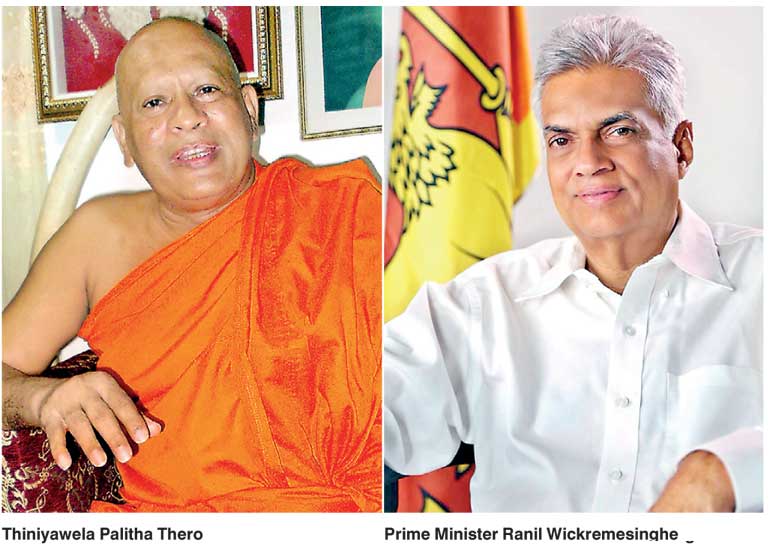Monday Feb 16, 2026
Monday Feb 16, 2026
Tuesday, 24 January 2017 00:01 - - {{hitsCtrl.values.hits}}
‘Monk’s petition on eve of bond debate in House’ was the caption of a front page story in the Sunday Times of 22 January. The UNP has sent their emissary to Hulftsdorp together with footnotes. There is a palpable air of duplicity.
These are the best of times and worst of times. Bonds between the spiritual and temporal are blurred. Some in the Buddhist brotherhood of our land are worried over Treasury bonds. Some are contemptuous over bonds between people of different sexual orientations. Morality is a set of values that demand absolute consistency. Today we are confronted with a societal ethos where the Buddhist clergy define the trajectory of our moral consistency. Scheming politicians co-opt them to manipulate minds. The ambitious among the ordained serve the highest bidder.
Go forth, ye bhikkhus, for the welfare and happiness of the many. “Caratha bhikkhave carika bahujana hitaya bahujana sukhaya,” Buddha advised the first 60 disciples after his first sermon in the Deer Park at Isipathana.

One of their present day successors, Thiniyawela Palitha Thero has now gone forth to Hulftsdorp. This writer has known the monk since the eighties. With a winning smile and a resonant voice, Reverend Palitha is a preacher much in demand. His temple in Nugegoda oozing the affluence of its urban middle class devotees is symbolic of our age. Material prosperity and spiritual solace are packaged and delivered in takeaway containers.
His charming personality has won him many abiding relationships with the mighty and the meek. He is a great raconteur and a good friend. This writer, convinced of his own superior knowledge of what the Buddha taught, has never discussed the ‘Dharma’ with him.  That said, he is definitely a mover and a shaker. This writer knows him as a venerably political apparatchik of the UNP, not hesitant to declare his party allegiance. He is a Director of Lanka Hospitals (Apollo) appointed by the Minister of Finance.
That said, he is definitely a mover and a shaker. This writer knows him as a venerably political apparatchik of the UNP, not hesitant to declare his party allegiance. He is a Director of Lanka Hospitals (Apollo) appointed by the Minister of Finance.
He has now gone forth to the Supreme Court for the welfare and happiness of the many over the COPE report on the allegedly tendentious issue of Central Bank bonds under the watch of its former Governor Arjun Mahendran.
The Sunday Times reporting the story asserts with laconic perspicacity that the Fundamental Rights (FR) petition challenging the report of the Committee on Public Enterprises (COPE) on the bond issue has been filed just days before Parliament is expected to debate the contents and findings of the COPE report.
There is no doubt that the alleged scam has undermined the credibility of the Ranil Wickremesinghe administration. It assumed office under a new presidency that was installed in office by a collective moral compass. Venerable Maduluwawe Sobhitha Thero was the principal moral voice in forging that moral compass. Sobhitha Thero’s purpose was the ‘happiness and the welfare of the many.’
No doubt the monk, aggrieved enough by the findings of the COPE report to seek redress in the Supreme Court, is also in a quest for the ‘infinite possibilities’ of a perpetual nirvana. It goes to show that even in the saffron community there exists different moral codes and moral priorities.
We can only await how this drama will unfold in the coming week in Court and Parliament. That the UNP has decided to either delay or scuttle the pending debate in Parliament by this puerile ploy would surprise only the naïve who believe that the present Leader of the UNP is the brand ambassador for an effective detergent powder.
Ask any maker of detergents. They will tell you that it is dirt that keeps them in business. The manoeuvre is no surprise. The choice of the saffron-robed warrior to do battle in Hulftsdorp removes any vestiges of secular leanings among the current leadership of the UNP. That is a disturbing development. It is the United National Party of genteel D.S. Senanayake that is in crisis.
Conversely, Chandrika Kumaratunge, the daughter of the man playing midwife delivering the epochal baby of 1956 Sinhala consciousness, is found today on record in the Hansard: “I am a Sinhala Buddhist, a robust dark Sinhalese as the saying goes and a very good Buddhist. However I will never carry a tray of flowers and sit under every ‘bo’ tree I see.”
President J.R. Jayewardene got many things right and some things wrong. But he was acutely aware of the perils of enlisting the priesthood in governance.
He wrote: “It was to help humanity that the Buddha founded the Order… It is another matter that the Order never quite became what it was meant to be. The Bhikkhus (homeless ones) very soon became priests, living in temples built like palaces. Today the lazy and ceremonious church, split into nikayas based on caste divisions, maintains its place in society not by tendering to the sick, the poor and the helpless but by placing a messianic halo above the Buddha-myth, and by chanting faint Pali gathas to the cold, fruitless moon.”
Why has the UNP decided to deploy a ‘saffron paw’ to pull its chestnuts out of the fire? Therein lies a deeper and more disturbing truth.
As long as our public discourse is held hostage by a Buddhist clergy that claims a privileged advantage over all other citizens on secular affairs, this nation will remain trapped in the frozen tribal mind frame of the Sinhala Buddhist majority.
The UNP is trying to play the Mahinda game. They will fail. Piety, pretended or perforce is Mahinda’s prerogative. With his ‘Lichchevi’ doctrine, Ranil is a rival preacher whose clumsy turn of Sinhala phrase makes him the permanent outsider.
The ‘Apey Hamuduruwane’ of Mahinda has a proprietary familiarity. With Ranil, it is plain simple phony. We do not know for certain what made him give way to the common candidate. What is certain is that he would have never made it on his own.
The tribal mentality of the Sangha community is real. It indoctrinates the individuals in to common tribal beliefs, and in particular to a sense of superiority over ‘others’ and more ominously, to an urgent sense of existential peril. Their nationalism pivots on a threat from the ‘other’.
The structural reality of the Sinhala Buddhist society is that the Sangha can dictate what is possible and what is not to the average citizen to whom ‘saffron’ is not just a hue but a world view. It is not something they have deliberately set out to achieve. It is something bestowed on them by politicians who outsourced mind manipulation to the Sangha in post independent Sri Lanka.
Today Bengamuwe Nalaka is an authority on devolution of power. Muruththetuwe Ananda is an expert on public administration. The two monasteries straddling the lake in Kandy claim omniscience on every facet of human endeavour.
The Sinhala national broadsheet with the highest circulation reported the recent Government decision to jettison the suggested legal provisions relating to sexual orientations in its front page with a banner headline. ‘The Government has rejected proposed changes to decriminalise homosexuality’ it screamed. No doubt, the Editor felt that it merited such prominence.
On 16 May 2016, a young novice monk was admitted to the general hospital at Matara. The doctors at the outpatient unit concluded that the young monk had been sexually assaulted. Only the weekly Sinhala Broadsheet Ravaya reported it. To the editors of Sinhala national newspapers, it was not news. Perhaps rightly so.
The rampancy of homosexual abuse of the young in our Buddhist monasteries is not as important as the constitutional recognition of the primacy of Buddhism. You may ask why. The answer is clear. We do not practice what the Buddha taught. We are guided by what the ‘Sangha’ preach. At least so it seems.
This essay was not about the issue of bonds. It is also not about celibacy observed by Buddhist monks more in breach than in observance. This is about what prevents the policeman from knocking the shaven heads of saffron-clad mobs attempting to climb Police barricades. It is about patriotic monks listening to the National Anthem reposing on their seats especially covered with white cloth.
This essay is about emotions and history which determine our ability to reconcile and adopt to a new set of attitudes and values towards a sustainable settlement of a persistent conflict – a map for national reconciliation. This is about those who recite ‘faint Pali gathas to a fruitless moon’.